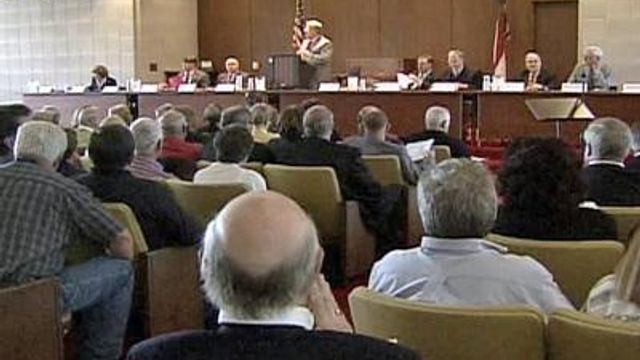Law's Foes Decry Annexation Without Representation
Opponents of North Carolina's involuntary annexation law told state House members at a public hearing Wednesday evening that it gives too much power to towns and cities.
Posted — UpdatedA House committee charged with recommending changes to the 1959 annexation law listened as more than 100 people came to the Legislative Building auditorium on Jones Street to speak for or against it.
Jerry Santoro told the committee he is surrounded by homes annexed into Raleigh and he is worried his property will be next.
"We feel that if we are annexed, there will be an additional taxes on us that maybe we couldn't afford,” he said.
The law allows towns and cities to annex adjoining land that meets certain population or development-density thresholds. The municipality must hold two public meetings and agree that it will provide emergency and street services to the new citizens. Landowners in the unincorporated areas set to be added don't have to approve the annexation through a referendum, however.
"I think at least we should have a vote for it," Santoro said.
The majority of people attending the public hearing echoed the same message.
"It is all about money. They want it. We have some, and they take it," homeowner Larry Wright said.
Municipal leaders and business boosters who spoke urged the panel to leave the law intact. They said it works well by helping the state manage growth effectively, offering improved water and emergency services to developing areas and raising city populations to bring in new industries and attractions.
"Our continued economic diversification efforts are enhanced and strengthened by our current annexation laws," Asheboro Mayor Pro Tem David Smith said.
"It's a way to have more folks who benefit from the economic strength of the cities," said Chuck Allen, mayor pro tem of Goldsboro.
Others argued that if people tap into city services, they should pay the same as its residents.
"Annexation provides a city with its only mechanism to provide city service. Users become city residents," Greensboro Planning Director Dick Hails said.
Rep. Bruce Goforth, D-Buncombe, said a University of Georgia study found that from 1990-1998, North Carolina annexed almost eight times as many households as the national average.
"There's a lot of unrest in North Carolina over annexation," Goforth said.
The committee, which also held a public hearing in Asheville, can make recommendations to the full House before the General Assembly reconvenes next month.
• Credits
Copyright 2024 by WRAL.com and the Associated Press. All rights reserved. This material may not be published, broadcast, rewritten or redistributed.





